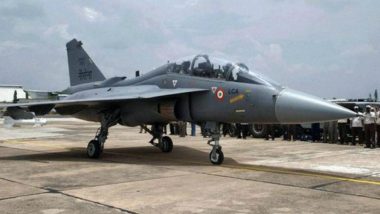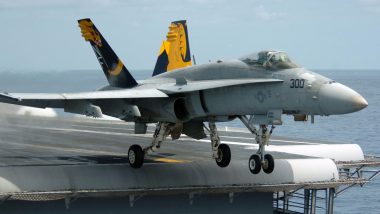Washington, March 19: F-16 jets give India a unique opportunity to be at the centre of the world's largest fighter aircraft ecosystem and it is the only programme with proven performance to meet its operational needs and 'Make in India' priorities, according to an American defence company. As India continues to shop around to add new fighter jets into its air force, Lockheed, which is the world's largest defence company which has offered to relocate its entire production line to India has said that it intends to create far more an F-16 "assembly line" in India.
"We plan to introduce two new words into the lexicon of international fighter aircraft manufacturing: "India" and "exclusive." F-16 production in India will be exclusive? Something that has never before been presented by any other fighter aircraft manufacturer, past or present," said Vivek Lall, vice president, Strategy and Business Development, Lockheed Martin in an interview. "The F-16 gives Indian industry a unique opportunity to be at the centre of the world's largest fighter aircraft ecosystem," Lall said.
"The F-16 provides unprecedented manufacturing, sustainment, upgrade and export opportunities to Indian industry well into the future. Only Lockheed Martin and its Indian partners can deliver the capabilities and industrial benefits to truly propel India's military and defence industrial base into the future, Lall said. He has played a key role in some of the big-ticket American military sales to India, including the General Atomics-built Guardian Predator Drones announced by the US last year. Known as a renowned global aerospace leader, Lall recently joined Lockheed after spending a few years in General Atomics.
"The F-16 is the only aircraft programme in this competition with the proven performance and industrial scale to meet India's operational needs and Make in India priorities," he said, claiming that no competing aircraft comes close to matching the F-16's operational effectiveness and industrial success.
"The success of the F-16?3,000 F-16s flying today with 25 leading air forces?is a testament to the cost-effective, combat-proven capabilities the F-16 delivers. That combination of cost and capabilities is why F-16 production opportunities today total more than 400 aircraft, including India," he said.
Lockheed is offering F-16 Block 70, which is the most advanced version of the aircraft. "The F-16 continues to aerodynamically outperform its competitors and advanced technologies are continually integrated into the F-16. Block 70 mission systems are completely new and leverage technologies from the F-35," Lall said.
The F-16 remains the backbone of the US Air Force, the world's most capable air force, he said. Structural and avionics upgrades to the US F-16 fleet will extend service life to 2045, while the F-16 becomes even more capable as technology enhancements from the F-22 and F-35 are continuously integrated across all three platforms, he added.
Responding to a question, Lall said the offer from Lockheed is a cost advantage for India. The single-engine F-16 has a 30-40 percent lower operation and maintenance cost per flying hour than twin-engine aircraft in its class, according to figures published by the Office of the Under Secretary of Defense, he said. "Whether you're talking about battlefields or budgets, the F-16 is the clear choice for India," he said.
Lall, however, refused to reply questions on F-35. "Any discussions regarding potential new F-35 customers begin at the government-to-government level. It is not our place to speak on behalf of the US government or the government of India," he said.
Notably the US Pacific Command Commander Admiral Harry Harris during his two recent Congressional testimonies have supported selling F-35 to India. "At the moment, India is considering a number of US systems for purchase, all of which USPACOM fully supports: the F-16 for India's large single-engine, multi-role fighter acquisition programme, Harris told the Congressional committees last week. He also said the purchase includes, F/A-18E for India's multi-engine, carrier-based fighter purchase; a reorder of 12-15 P-8Is; a potential purchase of SeaGuardian UAS; MH-60R multi-role sea-based helicopter; and F-35 Joint Strike Fighter.













 Quickly
Quickly




















